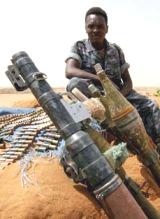US presses Sudan to accept UN peacekeepers
Jun 21, 2006 (WASHINGTON) — The United States pressed Sudan’s government on Wednesday to accept U.N. peacekeepers in the volatile Darfur region where experts say momentum for peace is fast slipping away while Khartoum balks at a U.N. force.
 Sudanese President Omar Hassan al-Bashir said this week it was out of the question for U.N. troops to be deployed to Darfur because they would come with colonial and imperial ambitions.
Sudanese President Omar Hassan al-Bashir said this week it was out of the question for U.N. troops to be deployed to Darfur because they would come with colonial and imperial ambitions.
U.S. State Department spokesman Adam Ereli said it was in Sudan’s own interests to accept a U.N. force to back up about 7,000 underequipped African Union troops struggling to keep the peace in Darfur, an area the size of France.
“As long as violence continues in Darfur, the Sudanese government is going to be held responsible, regardless of the circumstances,” Ereli told reporters.
“So the Sudanese government has a strong interest in a more effective security force in Darfur not only to be on the right side of the issue and to be seen as doing the right thing, but also to provide for better security for its own citizens.”
Ereli said the United States was working closely with the European Union and others to press Sudan to “recognise the reality” it needed a U.N. force in Darfur, where tens of thousands have been killed and 2 million have fled their homes in three years of conflict.
A joint U.N.-African Union technical team is in Sudan to assess the needs of a U.N. mission and how to support the African troops during a transition.
CRITICAL OF THE U.S.
Sudan experts are critical of the United States, the EU and the African Union for not doing enough to put pressure on Khartoum.
They argue that momentum built up after the signing of a peace agreement last month between Darfur’s main rebel group and Sudan’s government is fast dissipating because of Khartoum’s reluctance to accept a U.N. force.
Princeton Lyman, of the Council on Foreign Relations, said the Darfur agreement was fragile and the prospect of a U.N. force not being allowed in would encourage more violence.
“This is a very serious situation and it requires actions sooner rather than later. The first step ought to be to call a meeting of the U.N. Security Council,” he said.
Lyman urged the United States and others, including Arab nations, to be tougher on Sudan and impose sanctions on Khartoum outside of the U.N. Security Council if they refused to cooperate.
“For example, companies could be forbidden from doing any business in Sudan,” he said.
A report this week by the International Crisis Group, a think tank, said the Darfur deal had serious flaws and only an urgent, robust U.N. peacekeeping mission could save it.
The United States has labelled the violence in Darfur genocide and religious and human rights groups have piled pressure on the Bush administration to act.
The New York-based Elie Wiesel Foundation and more than 60 Nobel Prize winners announced on Wednesday the formation of a Commission of Nobel Laureates to monitor Darfur and recommend urgent actions to governments and international agencies.
“We express compassion with the victims and our anger at world leaders who are timorous, complacent and unwilling to take risks,” said Elie Wiesel, a Holocaust survivor and recipient of the 1986 Nobel Peace Prize.
(Reuters)
